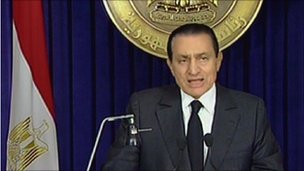Mubarak transfers powers to vice-president, but refuses to resign
11 Feb 2011 A defiant Egyptian President Hosni Mubarak has said he would hand over some of his powers to Vice-President Omar Suleiman, but continue in office until the September elections in order to oversee the transition period. However, he did not specify which powers he would transfer to Suleiman, who he appointed as his deputy only two weeks ago. In a televised address, he also announced six constitutional amendments including the lifting of emergency laws and a reform the political process. He pledged that there was no "going back to the old times" and that "national dialogue" with the opposition would continue during the transition period. He lamented the death of protestors, apologized to their families, and pledged to ensure that those in the state security apparatus who had killed people would be brought to justice.
A defiant Egyptian President Hosni Mubarak has said he would hand over some of his powers to Vice-President Omar Suleiman, but continue in office until the September elections in order to oversee the transition period. However, he did not specify which powers he would transfer to Suleiman, who he appointed as his deputy only two weeks ago. In a televised address, he also announced six constitutional amendments including the lifting of emergency laws and a reform the political process. He pledged that there was no "going back to the old times" and that "national dialogue" with the opposition would continue during the transition period. He lamented the death of protestors, apologized to their families, and pledged to ensure that those in the state security apparatus who had killed people would be brought to justice.
The Egyptian president reiterated a pledge that he would not run in the presidential elections planned for September. He expressed pride of his "sixty years of service" to Egypt and said it pained him what was expressed by some people in his country. Mubarak also criticized foreign interference in the Egyptian political process.
Mubarak's speech came as a huge crowd gathered in Tahrir Square and Gen. Hassan al-Roueini, the military commander for the Cairo area, told thousands of protesters in the afternoon: "All your demands will be met today." When asked by a reporter if that meant that President Hosni Mubarak would leave office, Army Chief of Staff Sami Eman replied, "It ends tonight." Egypt's armed forces had issued a statement on the radio, saying they would protect the people and their demands. The protests, in their 17th day, had gained momentum again as protesters and labor unions across the country went on strike.
Reactions to Mubarak's speech were criticial, with commentators saying he had failed to meet the protestors' demands by not resigning immediately. US President Barack Obama issued a strongly-worded statement, which stated: "The Egyptian people have been told that there was a transition of authority, but it is not yet clear that this transition is immediate, meaningful or sufficient. Too many Egyptians remain unconvinced that the government is serious about a genuine transition to democracy, and it is the responsibility of the government to speak clearly to the Egyptian people and the world. The Egyptian government must put forward a credible, concrete and unequivocal path toward genuine democracy, and they have not yet seized that opportunity."
Obama added that Egypt had to "move swiftly to explain the changes that have been made, and to spell out in clear and unambiguous language the step by step process that will lead to democracy and the representative government. There must be restraint by all parties. Violence must be forsaken," he said.
The European Union and Australia also pleaded for change and Germany said Mubarak had not allayed the fears of the world. "Egypt will explode," the Egyptian Mohamed ElBaradei wrote on the 'Twitter' website. "The Army must save the country now."